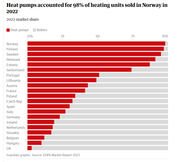Gas (and other energy) outlook
Posted: Sun Feb 25, 2024 9:07 am
Interesting article in the Guardian/Observer today
https://www.theguardian.com/business/20 ... GTUK_email
https://www.theguardian.com/business/20 ... GTUK_email
Gas’s future looks cloudy as demand and prices tumble
A conference this week will discuss a market being transformed by green energy, LNG and milder winters
The annual International Energy Week conference will see bosses gather at a hotel in Mayfair amid a tense debate over the pace of oil and gas firms’ transition to low-carbon energy. Last year, then BP boss Bernard Looney (since defenestrated) defended its fossil fuel spending over the sound of noisy protests outside. Activists later let off a smoke bomb at a black-tie dinner, forcing executives on to the street in front of protesters.
Speakers will include the chief economists of BP and Shell, and the bosses of France’s Engie, the UK’s Octopus Energy and oil trader Vitol, as well as Ed Miliband, the shadow energy secretary, representing a Labour party under scrutiny for watering down funding for its green policies.
A significant talking point at the conference will be the role of gas in the energy transition – and the impact of falling wholesale prices. In recent weeks, European natural gas prices have fallen to levels not seen since before Russia’s invasion of Ukraine in February 2022, which intensified an already escalating energy crisis. Gas has been trading at €23 a megawatt hour, the lowest since May 2021 – and down from highs of €319/MWh in August 2022.
A multitude of factors have contributed. “European demand remains very low with the second mild winter on the trot,” says Tom Marzec-Manser, head of global gas analytics at consultancy ICIS. “A lot of gas is normally used for heating homes and businesses across Europe, and it hasn’t been used this year.” Warmer, windier weather has also reduced the need for gas-fired power stations to generate electricity, with the under-pressure windfarm industry stepping in. As a result, storage levels in Europe’s gas facilities remain high.
